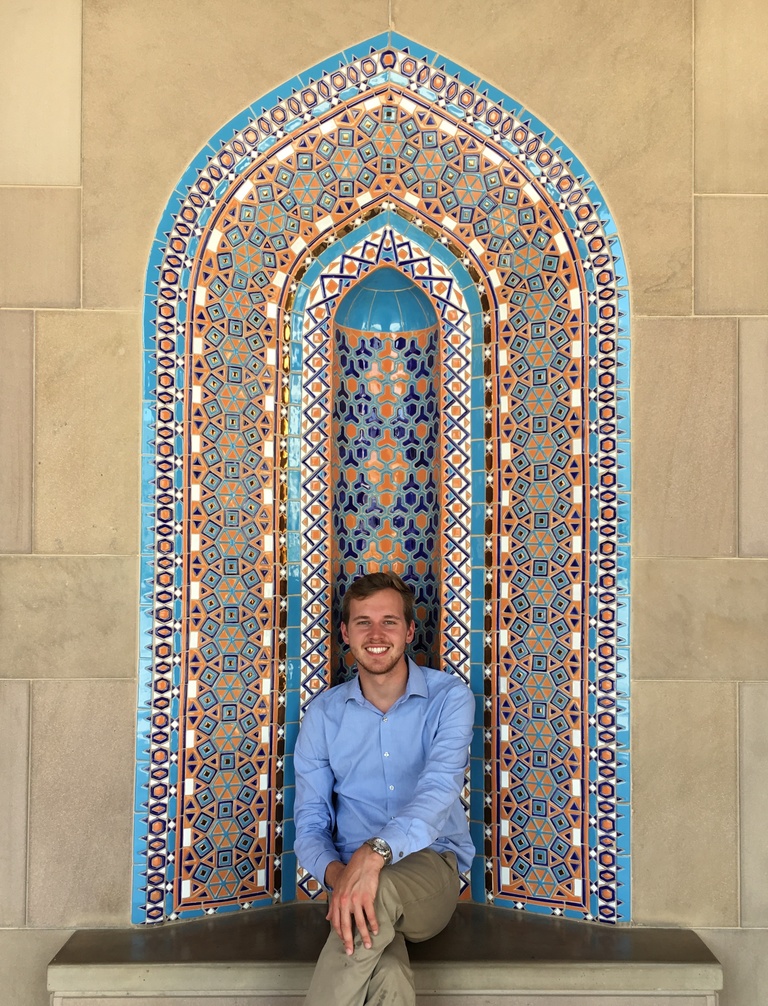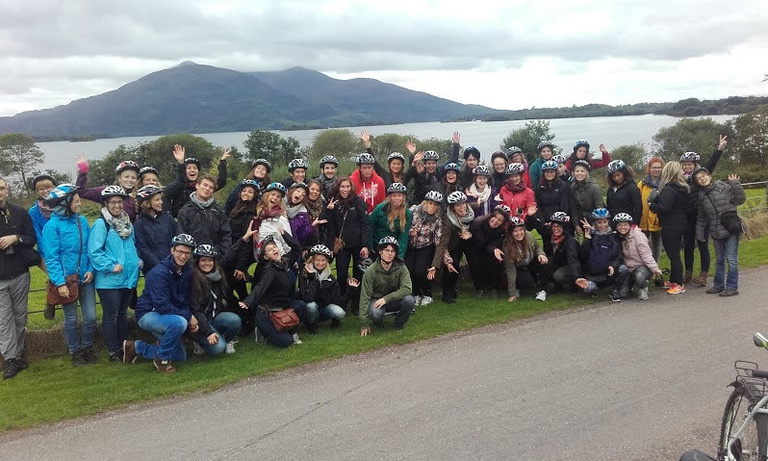
After three days of orientation, 18 hours on planes, and two hours driving, I am finally in Ibri, Sultanate of Oman! This summer, I will be studying intensive Arabic (both Modern Standard and Omani Dialect) at the Noor Majan Institute after being awarded a Critical Language Scholarship through the U.S. State Department. I am very excited to get a glimpse into the Muslim world and into life in an off the beaten path destination for study abroad.
I want to kick it off with two things: Omani culture is incredibly intricate, and it is HOT. It’s 11 p.m. and it’s still 100°F. It’s a kind of heat that feels like a weight under your eyes and sucks the moisture off your lips and armpits before you even notice you’re sweating. The temperature regularly surpasses 110°F degrees every day in the summer months, and it’s supposed to be 117°F later this week (which explains why tourists are all but absent). Rain is remarkably rare, and it’s common for Omanis in this region to greet one another with “has it rained in your town?”
The last several days have been a cultural crash course like no other for a country like no other, and it’s something I feel compelled to share in detail. So, here it goes: a non-authoritative, arguably incomplete glimpse into the cultural adjustment that lays ahead of me.
I want to start off with something one of our program directors (who is Yemeni) told us before she started her presentation: all human culture is relative. What is disturbing and unthinkable for Western culture has many parallels in Islamic culture—i.e., many of the things we practice in our society are deeply disturbing to Omanis. In the same way that Westerners largely disavow first cousin marriages, authoritarianism, or the consumption of animal brain, many Omanis take great offense to certain attributes of American and Western life.
Regardless of the time of year, these activities are generally considered unacceptable by Omanis:
- Wearing shorts (police routinely ask tourists at Western malls in Muscat to change)
- Nonprofessional social interaction between unrelated men and women
- Smoking
- Swearing (which is a punishable offense under Omani law if it is deemed to “insult the honor” of another person)
- Criticism of the government and HM Sultan Qaboos (also a serious criminal offense punishable by deportation or prison)
- Shunning the 5 pillars of the Islamic faith
- Asking a man about his wife—or worse yet, mentioning her name—is a grave offense. Euphemisms like “how’s the family?” and referring to married women as “the mother of _______” are acceptable alternatives that according to many, “preserve the dignity” of married women.
During the holy month of Ramadan (May 17 – June 15, 2018), many Omanis find a number of other activities and behaviors to be especially offensive, although some are considered haram:
- Women without head coverings
- Playing music
- Running (except for exercise)
- Dancing
- Yelling
- A host of activities involving the mouth, including speaking poorly of another person or breaking fast before sunset (it is illegal to eat or drink in public during the holy month out of respect for those fasting)
However, this is not Saudi Arabia: women have long been able to drive, movie theaters have shown American movies for decades, and the death penalty is exceedingly rare.
I want to be clear that a conservative society does not equate to a hostile environment towards foreigners. Arabs I’ve talked to from Iraq to Yemen have told me Omanis are among the most tolerant of different cultural and religious backgrounds and are the kindest people in the region. Despite maintaining strict interpretations of their own faith, Omanis avoid sectarianism of any kind (the majority are neither Sunni nor Shi’a Muslim, but Ibadi) and many believe animosity towards those of other faiths is in conflict with Islamic teachings. For this reason, virtually no Omani has ever been convicted of terrorism, and no terrorist attack has ever taken place in the country’s modern history. Violent crime is almost unheard of, making Oman one of the safest countries in the world.
Even though there aren’t any laws on the books dictating the behavior of women and modesty, almost all women choose to wear black abayas. Abayas cover their entire body except for the hands and face, and it is not uncommon to see women from conservative families donning Arabian-style burqas in public. During a trip to the supermarket the other day, some women in my program felt very uncomfortable or got looks for not wearing abayas. One student who did was complimented with enthusiasm.
Generally speaking, most things considered highly offensive in Oman come down to either immodesty or attacks on the honor of an individual or a family. In many Islamic societies (especially more conservative ones), the idea of individually-held rights is foreign. Rights are seen in the context of the family and individual actions that bring dishonor to the entire family are seen as violating the collective right of the family to preserve its reputation. Newspapers publish only the initials of those convicted of crimes in order to protect familial honor. I strongly recommend that students at Iowa interested in learning more take Ahmed Souaiaia’s “Human Rights in Islam” to get a better understanding of these concepts—I am not sure I would be here without what I learned in that class.
To conclude, I again want to stress that none of this means Omanis shun Westerners. Even women who are completely veiled sport the most fashionable of handbags by Michael Kors and Gucci, and my language instructors are humorous and constantly smiling. There’s definitely a learning curve to the cultural adjustment that is unlike anything I have faced before, and I’ll share updates in the coming weeks as I get to know Omanis and explore the community a little more. Until then, masalaama!

To kick off out first morning in Oman we visited the immaculate Sultan Qaboos Grand Mosque in Muscat and got a quick lesson on Ramadan and women in Islam from a woman at their Islamic information center

The view from my apartment building at the Noor Majan Training Institute in Ibri